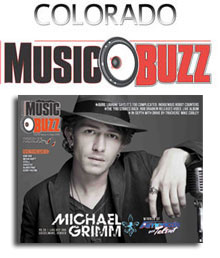The Manager’s Corner- March
By Chris Daniels
I’ve managed my own band for 31 years and I’m in the Colorado Music Hall of Fame. All that’s nice but today’s music business is changing at light-speed and you have to be more engaged in the ‘biz’ than ever. Some things have not changed, careers are still built on some tried and true elements: great music, performance and timing. But today’s artists must work harder than ever to succeed. The good news is that we have new tools to help young musicians grow their fan base. The book I wrote for the course I teach at CU Denver on artist management is called “DIY: You’re Not in it Alone.” While you are ultimately responsible for your own career, these days it’s essential to make the most of all the help that is offered along the way.
One of the more common statements I hear in my music business classes at CU Denver is, “You don’t need a record company anymore.” I have two basic responses to that, (1) you are right, you can put out your own record, I have done it many times and I’m in the middle of doing it again, (2) every time I have signed a deal with a major or independent record company the percentage I made on each album was small (the industry standard is less than 15%) but the advances to my career were much greater than a self-released album. And there is one additional problem with a self-released album: the cost of recording and promoting it.
Now I will grant you that it is very easy these days to record great tracks with your computer in your home studio and to post it on BandCamp, ReverbNation or SoundCloud. But here is the reality: that is not promoting an album or a recording. Unfortunately, a lot of those recordings are also not mastered, so the sound quality is not at the level that radio or even independent films, TV or internet-webisodes need. Mastering is an art and if you don’t have those skills, getting somebody to do that with/for you is essential and that costs money.
So let me break this down into the two philosophies and practices I teach. First, if you are going after a deal from an independent or a major label you are going to give up the rights to ownership of the master recording (in a lease deal for about 5 to 10 years) or in a full-on label deal they will own the master unless you are very skilled a negotiating some alternative terms. Second, labels are not making what they used to on the sale of recorded music. I have written many times about the rates that Spotify and Pandora pay labels and it is in the micro-pennies per stream. I’m not arguing the value of streaming – I think it has its place. Just establishing that labels can’t really make a profit under current conditions just on the sale or streaming of recorded music. So majors have adopted the 360-deal whereby they “partake” in the profits of “making you famous” or at least creating demand for you music through their marketing. A lot of artists have put out their own albums and then come to a point where they wanted to go beyond what their self-owned label could produce in terms of success – Macklamore & Lewis are a classic case. So when an artist signs with a major label, the aforementioned 360-deal gives the label a percentage of the earnings from the artist’s performance, merch sales, product endorsements, sponsorships, acting and sometimes even publishing royalties. The percentages vary but I can safely report they average about 10% from each revenue stream “after arms length deductions” – meaning your manager and agent’s percentages that come off the top are a legitimate expense, the label takes their percentage after those people are paid from the gross. OK, did you follow all that? Here’s where it gets a little weird. The majors tend to pay about 15% of gross on the sale of recordings (your royalty) to the artist. But there are “deductions” to that royalty for things like the CD or vinyl package itself (technically the label only pays for the “program” of music)…weird right? And there are others. Why in hell would you sign with a label if they are (a) taking a percentage of your income from things like performance and (b) giving you an effective royalty rate of about 10% to 12% on the sale of vinyl or a CD? Two reasons – (a) if your Adele and you sell 21 million that is about 3 million in royalties JUST from the sale of records and (b) the promotion machine that is responsible for taking two Seattle based musician/producers from sales of about 50,000 to sales of multi-millions of units and several Grammy nominations and awards is pretty powerful.
This is not a minor point! My classes are often astonished when they hear me say, “If you get a legitimate offer from a major label, I would strongly consider taking it after you have it reviewed and “vetted” by a lawyer.” The power of the three majors (Universal, Sony and Warner Brothers) and their affiliate labels is such that it is the brass ring, the Willie Wonka golden ticket. Does it go wrong? Hell yes. But even when it does it is a catapult from relative obscurity to a much much larger fan base…something that hours and hours of touring in a van and internet promotion cannot match. Take Amanda Palmer for example. Even though her album was a technical “flop” with her band the Dresden Dolls on Road Runner (a great independent and an affiliate of Warner Brothers) it did sell about 25,000 copies. In 2001, the year that N’Sync set the record for most sales in one week (2.5 million) that disappointing 25K was considered a failure. After Palmer negotiated her way off of RR/WB she funded her own record through Kickstarter. To this day she holds the record for the most amount of money raised on that platform for the recording of an album and tour support, about 1.2 million. But oddly enough, the number of backers almost exactly matched the number of units she sold. Is that a coincidence? I don’t think so, and I truly admire what she did. And Bonnie Raitt did it too…with her last album. When I talked to Bonnie at the Americana Radio Conference in Nashville she talked about her independent album making her more money than any previous album with Warner Brothers…but that WB had built her following (along with her amazing talent, guitar playing, great singing and constant touring). The point is simple, majors still have the power to take a fantastic local band like the Fray or Big Head Todd and The Monsters from solid regional sales of a song like “Bitter Sweet” or “How To Save A Life” and catapult them to national stardom.
And independents perform the same miracle but on a smaller scale. I signed to Provogue (they have Robert Cray, Joe Bonamassa and others) in 1990 and that album took Chris Daniels & the Kings to Europe for 21 tours at major festivals! The deal structures are different, often times you can get a 50/50 split of profits after the label recoups all their costs (from recording to promotion) but they have power too. Look at what Dualtone did for the Lumineers and Shovels and Rope. The one ESSENTIAL thing that an independent must have is great distribution and a great marketing department. There are a LOT of total BS independent labels that have NOTHING and you can do a better job of putting out the record yourself. I have seen some contracts from these labels that are horrific and ask for things like ownership of publishing and master when the artist is actually paying to be on the label!!! AAUGH!!! Don’t sign rip off deals like that for god’s sake! But good indies with great distribution and great marketing can really help your career.
DIY is fantastic but most artists don’t have a clue as to what is REALLY involved in putting out an album. Here is a short list, much of which I have covered in various articles in the past, but that warrants repeating. (1) FUNDING, kickstarter, GoFundMe and all the rest are great but you have to have the fan-base to make them successful (2) RECORDING AND MASTERING, if you are talking about something that is competing with the majors (and everything is) then it’s got to stand up to the quality of everything that is on your favorite radio station (3) DISTRIBUTION, if you are going to break beyond the local market in touring then you want to go beyond the wonderful folks at Twist & Shout and Wax Trax and Barts to getting it into independent stores where you are touring..and that takes research and contact (4) MARKETING, on the internet and on radio …yes radio. Here in Colorado we have amazing stations that play local music, Open Air on KCFR, KUNC in Greeley, KBCO, KUVO to name only a few. But here is the thing, there are 750 stations in the US that are currently doing blues related shows … and that is just one style and format. Artists forget that radio “made” some of the biggest names in the business. But that also means you are giving away 750 CDs if you are a blues artist…(see #1 funding) and, (5) TOURING, just because you can sell out Cervantes or the Walnut Room doesn’t mean ANYBODY knows who the hell you are in Chicago, Minneapolis, Cleveland or New York. There are ways to tour economically and that is what will talk about next time. For now, think hard about your recorded music. If you’re serious, you need to think of it beyond just the art/music you make. You need to think of it as your biggest marketing tool and who has the power to wield that weapon in the most effective way to, as my students always say, “get your music out there.”
Category: Shop Talk






